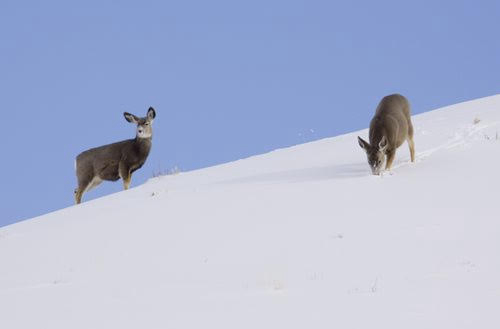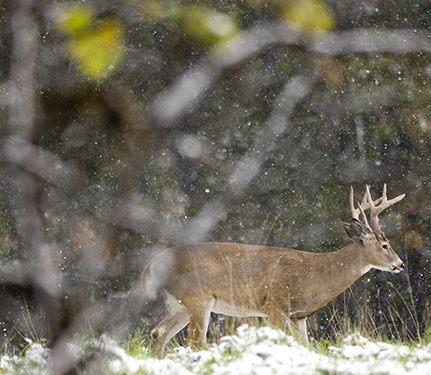Supplemental deer feeding permits available in southern U.P.

The Michigan Department of Natural Resources yesterday announced the availability of winter supplemental deer feeding permits across the southern section of the Upper Peninsula.Winter Michigan deerPermits allowing private citizens and sportsmen’s groups in the U.P. to provide supplemental feed for deer during the winter months are issued by local DNR wildlife biologists under certain provisions.
Supplemental feeding in the northern part of the region began earlier this month. For the southern U.P., accumulated snowfall depth measurements trigger the issuance of permits.
“Although we continue to have high concerns regarding potential for communicable diseases, such as chronic wasting disease, and would prefer that people not feed deer, the snow depth readings we tabulated today reached the level where we begin to issue supplemental deer feeding permits,” said Terry Minzey, DNR U.P. regional wildlife supervisor.
Snowfall depth totals are collected beginning in November.
For Iron, Dickinson, Delta and Menominee counties and that portion of Marquette County south of the boundary between Township 43 North and Township 44 North, permits are issued if accumulated snowfall depth averaged between the Crystal Falls and Escanaba DNR field offices reaches 48 inches by the Monday nearest Jan. 15.
In Schoolcraft and Mackinac counties and that part of Chippewa County south of the T43N-T44N boundary line, permits are issued if accumulated snowfall depth averaged between the Manistique and Naubinway DNR field offices reaches 60 inches by the Monday closest to Jan. 15.
It’s important to consider the types of food used to feed deer.
Easily digestible food sources most beneficial for feeding deer include grains, second-cut alfalfa, clover, and pelletized deer food. Although deer make use of apples, potatoes, sugar beets, carrots, and many other foods during summer and fall, these provide little benefit for deer during winter conditions and are not legal for supplemental feeding under permits.
“Permits are free of charge and may be obtained from wildlife biologists at several of our DNR offices located across the U.P. Permission must also be obtained from the landowner,” said John Pepin, DNR deputy public information officer. “There are several rules in place for supplemental deer feeding.”
Among them:
Feed must be placed at least a quartermile or more from the nearest paved public highway (this includes any paved, asphalt, or concrete roadway); at least 1 mile from domestic farm animals, and at least 1 mile from wheat or potato fields, commercial fruit orchards or commercial plant nurseries or tree farms, unless otherwise specified in the permit.
Feed can consist only of grains, second cut alfalfa and clover, and pelletized food materials containing no animal protein. The feed must be scattered on the ground at a depth not to exceed 3 inches.
Anyone issued a supplemental feeding permit must agree to assist the DNR in collecting deer tissue samples for disease surveillance and must report to the DNR by May 30 the quantity and type of feed used, dates and duration of feeding, and other required information specified in the permit.
Anyone who fails to comply with the supplemental feeding provisions will be ineligible for any future supplemental feeding permits.
In the event chronic wasting disease (CWD) is documented at a location within Michigan, within 10 miles of Michigan’s border with another state or Canadian province, or as determined by the DNR director, the director will issue an interim order banning the use of bait and the feeding of deer and elk, at a minimum, within the relevant CWD management zone.
Recreational feeding of wildlife is also allowed on private land in the U.P. year-round, provided the feed is placed within 100 yards of a residence and the total amount of feed does not exceed 2 gallons at any time. The feed must be scattered on the ground and must be at least 100 yards from areas accessible by livestock.
Supplemental deer feeding permits are available by contacting DNR offices located in Baraga, Marquette, Crystal Falls, Escanaba, Newberry, Sault Ste. Marie and Shingleton (Cusino).
For more information on deer in Michigan, visit: www.michigan.gov/deer.





